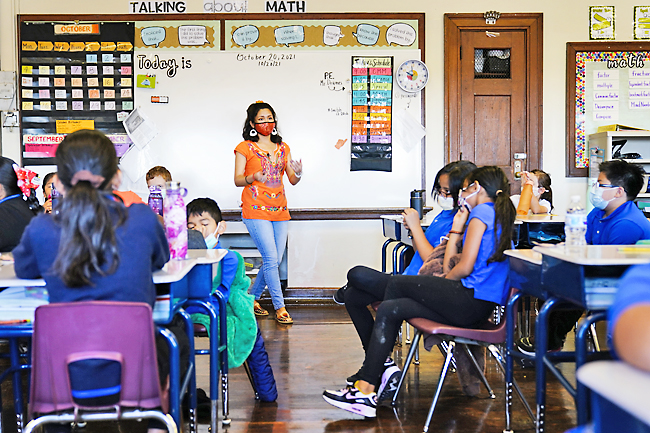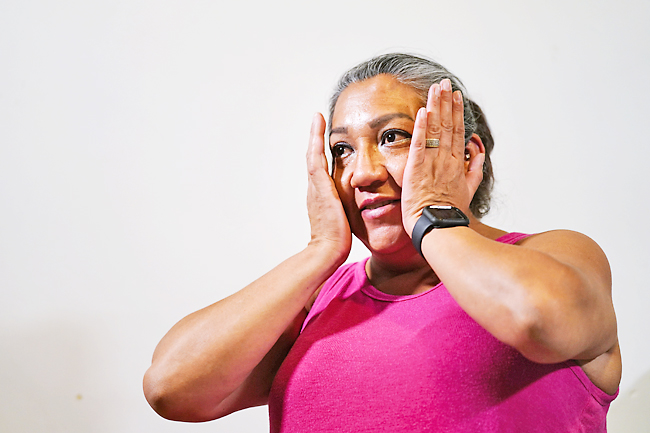PHILADELPHIA (AP) – Philadelphia parents who don’t speak English said they’ve long been excluded from parts of their children’s education because of language barriers, an issue that’s only been exacerbated by the pandemic and the return to in-person learning.
Parents told The Associated Press stories of students being used as translators despite federal prohibitions, incorrect telephone translations or poor communication when their children were being bullied. Experts said Philadelphia is not alone, noting that many school districts have lagged in creating systems that treat non-English speakers equally rather than responding to complaints.
Philadelphia school district officials said the district has made a lot of progress in recent years, including sending communication in parents’ languages and hiring dozens of additional in-school interpreters called bilingual cultural assistants (BCAs). They said the district has policies against using children as translators and robust guidance on how to request language help.
Still, problems persist.
Mandy, who asked the AP not to use her last name, has a 10-year-old son with special needs. She struggled with whether to return him to in-person schooling, but ultimately decided the virtual option didn’t offer enough support for parents who don’t speak English.
Mandy said her biggest struggle with language access has been during special education meetings at her son’s previous school. Even though things have improved since she transferred him to another school in 2020, she still spends hours translating documents into Mandarin because the district provides very few fully translated documents.


ABOVE & BELOW: Olivia Ponce; and Mandy

During one meeting, a telephone translator said she didn’t know anything about special education and refused to translate, so Mandy started bringing a bilingual friend as a backup. Another time, a translator told Mandy the district was going to teach her son to “eat meat”, which her friend quickly corrected, explaining the specialist was talking instead about goals for feeding therapy.
“It sounds like a comical incident, but it was really frustrating,” Mandy said in Mandarin through a translator. “It feels like immigrant parents are deliberately excluded and pushed to the margins.”
Deputy Chief of the district’s Office of Family and Community Engagement Jenna Monley said the office has issued guidance to school and district staff to transition to in-person interpreters for individualised education plan meetings when possible.
The Philadelphia school district saw an increase to more than 16,500 English learners in 2020 from around 12,000 in 2013, and Census numbers show nearly a quarter of people in Philadelphia older than five speak a language other than English at home.
Philadelphia City Councilmember Helen Gym, who has spent years advocating for education and immigration issues, said she wants interpreters in every school every day, as well as more multilingual staff including counsellors and nurses.
“We have a long way to go to enforce the language access mandates that are clearly in the legal books and were in fact the source of many different lawsuits and consent decrees,” she said.
Gym said immigrant families often seem like an afterthought.
“This was a city a decade ago that was on the brink of walking away from its public schools.
And that would have been devastating for immigrant communities,” she said, referring to deep budget cuts around 2011 after changes to the state’s education funding formula.
She said the district closed nearly 30 schools and barely escaped financial crisis, but the number of BCAs – which are the district’s main resource for parents who speak languages other than English – was cut in half.
Monley said the district has 101 BCAs after hiring about 45 over the last few school years.
She said they serve in 108 schools with the greatest needs for language help out of about 220 total schools. Many BCAs float between multiple schools every week.
Even with the hiring, the district has close to the same number of BCAs it had a decade ago for thousands more students and families, Gym said.
Olivia Ponce said she was frustrated by a language barrier when both her children, who are nearly a decade apart in age, were in school. The 46-year-old single mother recalled trying to talk to a school counsellor when her daughter, Olivia Vazquez, was hit by another student.
An interpreter was only available once a week, so the counsellor pulled a student out of class to translate. Ponce said the student wasn’t translating accurately, and she became so frustrated she shouted, then kept her daughter home for a week.
Experts said many districts, not just in urban areas, have seen increases in students and parents who speak languages other than English. Educational justice researcher Dominic J Ledesma said many districts try to provide what’s necessary under the law without thinking about making schools an inclusive place for immigrant families.
“Legal compliance and civil rights compliance are just as important as the equity issues at stake. Those issues are really pervasive and systemic in nature and not limited to Philadelphia. It’s everywhere,” said Ledesma. “In an equitable system… it’s the administrators who are accountable to all parents.”
No comments:
Post a Comment